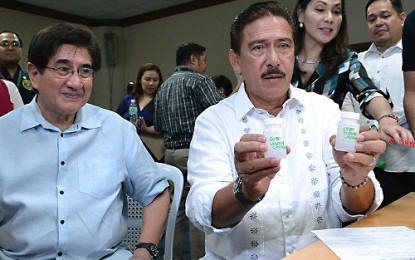
DRUG TESTING. Senate President Vicente "Tito" Sotto III and Senator Gregorio Honasan II show the urinal cases for undergoing drug testing at the Senate in Pasay City on Monday (July 30, 2018). (PNA photo by Avito C. Dalan)
MANILA -- More than 300 officials and employees of the Senate on Monday were subjected to random drug testing, led by Senate President Vicente Sotto III and Senator Gregorio Honasan II, who volunteered to undergo the procedure.
The random drug test is done annually at the Senate in compliance with Civil Service Commission Memorandum Circular (CSC) No. 13, s. 2017 that requires all government agencies and offices, including constitutional bodies such as the Senate, to submit a regular report to the Dangerous Drugs Board on the conduct of drug tests and the number of personnel who tested positive, if any.
Sotto and Honasan subjected themselves to the drug testing after the weekly flag-raising ceremony at the Senate. Both senators tested negative for any illegal drug substance.
The departments of the Senate were randomly selected for the drug test to ensure its impartiality.
In the 2016 national elections, Sotto and Honasan voluntarily underwent drug testing during a leg of their campaign in Cebu City to set an example to the other candidates on the need to be transparent about their medical records.
It was also to stress the responsibility of public servants to maintain a drug-free lifestyle.
Candidates for public office are not required to undergo drug testing as affirmed by the Supreme Court in a 2008 ruling.
Republic Act 9165 or the Comprehensive Dangerous Drugs Act of 2002 provides that officers and employees of public offices shall undergo random drug testing though.
Any officer or employee found positive for use of dangerous drugs could face suspension or termination, subject to the pertinent provisions of the Civil Service Law.
Based on CSC Circular 13, the objective of the random drug testing is to ensure that government agencies remain drug-free.
The conduct of mandatory random drug testing also serves as a condition for the retention of public officials and employees in government service.
Sotto, a strong advocate against illegal drugs, said the drug testing on the Senate personnel is one of the most stringent types available.
He also assured that the results of the test would be held confidential as guaranteed by RA 9165. (Senate PR)
